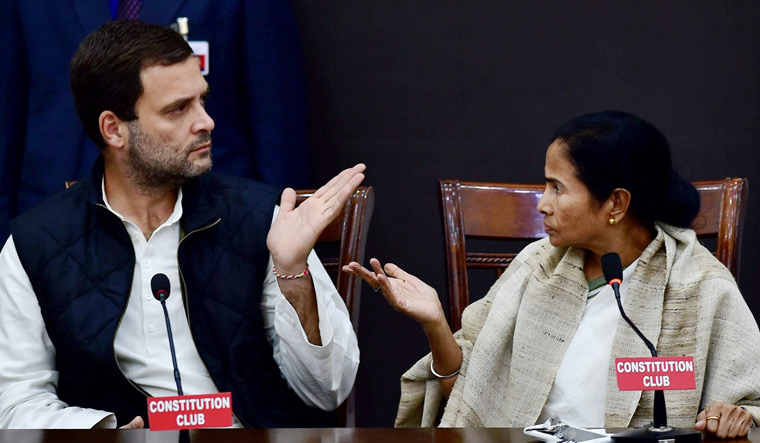Till 2016, Mamata Banerjee dithered on a decision to join any third front at the national level. This was because, obviously, such a formation would have had left parties as constituents.
But over the years, with the left vanishing from power (except in Kerala), Banerjee has come forward to be an architect of a third front. She has met with Telangana Rashtra Samithi chief K.C. Rao, is in touch with N. Chandrababu Naidu, Tejashwi Yadav and M.K. Stalin and had met with Shiv Sena chief Uddhav Thackeray and NCP chief Sharad Pawar in Mumbai.
Apart from engagements, Banerjee has a very good relationship with Akhilesh Yadav of the Samajwadi Party and Gujarat Patidar leader Hardik Patel. While Yadav said he would have no problem to accept Banerjee as the prime minister, Patel had dubbed her as a “lady Gandhi.”
But the problem that remains is that Banerjee is trying to build this front without Congress president Rahul Gandhi in it. She would like to see a common leader of this front whom the Congress would support.
Despite the fact that once a broader alliance against BJP is in shape—and Gandhi, being the leader of the largest party of that front, would be the ultimate contender for the prime minister’s job—Banerjee and others are reluctant to give him such an edge. So the front would like to go to the elections in 2019 without having any candidate as a prime minister but on the basis of seat sharing.
But Congress insiders say Gandhi would like to be seen as the prime ministerial candidate in 2019. Moreover, he would like to see the Congress gain ground all over India. Even if Modi loses, Gandhi knows it would be nearly impossible to run a government with such a fragmented mandate. He, therefore, would like to see the rise of the Congress and would like to raise the party like a true cadre-based outfit by “demolishing the gap between workers and leaders.”
But will a third front lead to a solid formation against Modi?
Apart from Congress, another force that would try to demolish such a plan would be the left parties, particularly the CPI(M). The Marxists showed that they might not be the king anymore, but they could aim to be the king maker or 'king breaker'.
The farmers’ rally in Maharastra showed that it would useful for NCP and Congress to accept the left as a force as well. But officially they could not come to have any ties with Congress due to party constitution. However, needless to say that with about a dozen of seats they might win in next general election (mostly in Kerala), they would certainly be one of the stakeholders and would never be able to accept Banerjee as the leader of the alliance. It’s not clear whether both TRS and TDP would join hands to oust Modi. YSR Congress also cannot be part of an alliance with TDP. The same dilemma appears in the case of Shiv Sena and NCP as well as AIADMK and DMK.
The only exception would be BSP and SP. But while putting together an alliance, these parties also run the risk of the disunity in their parties. The BJP claims that many leaders from the two UP parties are getting in touch with their senior saffron party officials and would join them once it’s decided that both the arch-rivals would join hands for the sake of opposing Modi.
Amid all these complications, Banerjee is trying to make the impossible possible. She would come to Delhi once it will be clear that all the constituents would be ready to meet. Gandhi knows the complexity. He would have to stand against the left to win Kerala or otherwise BJP would make inroads. He would have to fight Banerjee to win seats in Murshidabad and Malda of West Bengal, which would give half a dozen seats. He would have to fight against TDP in Andhra Pradesh. He would have to fight Shiv Sena in Maharastra. All these states are not small in size.
“He has made it clear to all of us that Congress would have to cross 200 seats in the next election. Only then, it would lead to a stable coalition government. So, Congress would never run the risk to damage it’s party organisation in states just to be in a coalition as he knows that such coalition could break any time,” said a senior AICC member from Bengal.
Perhaps that is the reason why Banerjee spoke to all, but not to Gandhi.


